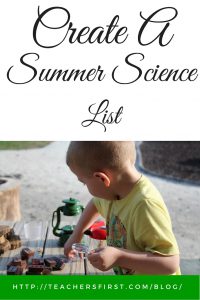Most schools and teachers prepare summer reading lists for students, but have you considered creating a summer science list? Summer is the perfect opportunity for students to explore science concepts through online videos, hands-on projects, and digital learning courses. Now is the time to consider options to share with your students for interesting science activities to enjoy all summer long.
Some lucky students spend part of their summer away at summer camps, but most don’t have that opportunity. Fortunately, there are several online choices for summer science camping from home.
- Camp Google is a free science camp geared toward 7 to 10 year olds with weekly activities led by experts from Khan Academy, National Geographic, and the National Park Service. New activities begin in July; however, previous activities are online and available to complete at any time.
- Maker Camp is an online community for kids in grades K-8 who are interested in crafting, tinkering, and building. Sign up at anytime to join other like-minded students to share ideas and download videos and tutorials.
- Pixar in a Box offers learning tutorials demonstrating math and science concepts used as part of animated film-making projects. Students learn through video tutorials then practice concepts with interactives and practice problems. The suggested age for these activities is fourth grade and higher.
- Khan Academy is a very popular learning platform for a good reason. The high quality learning videos cover a large range of topics at many different learning levels. Although there are lessons for all grade ranges, science content is geared toward 4th grade and up. Be sure to share the Discoveries and Projects section containing introductions to robotics and engineering concepts.
Many students are very interested in coding and gaming; however, time (and resources) may be limited to teach these topics throughout the school year. Several sites offer coding instruction for beginners through advanced levels. You can see a complete list of TeachersFirst Coding in the Classroom resources here.
- Anybody Can Learn Code offers instruction for all ages beginning with 4-year-olds! The self-paced courses guide students through short video tutorials and hands-on practice with concepts.
- Codecademy provides advanced instruction on how to build websites, games, develop javascript, and more. Short, focused lessons on singular topics allow users to learn individual skills and then apply them to projects and quizzes embedded in each lesson. The recommended age for this site is 4th grade and up.
Students love viewing videos on YouTube, so summer is the perfect time to share some great channels to explore and review science concepts.
- Khan Academy offers a YouTube channel in addition to its website of learning tutorials. The videos provide instruction in science topics such as physics, biology, and chemistry for middle school and older students.
- SciShow Kids YouTube Channel contains short, entertaining, science videos that appeal to students in approximately 3rd Grade through high school. In less than five minutes, viewers can learn about the smelliest flower in the world, meet the five dwarf planets, and much more.
- Steve Spangler brings his fun and educational experiments to his entertaining YouTube channel that is sure to appeal to students of any age. In the short videos they conduct experiments, but leave it to viewers to decide the science involved.
This summer also brings the Summer Olympics from Rio de Janeiro providing the perfect opportunity for exploring the Science of the Summer Olympics. Share this site with students to learn about the biomechanics of a runner’s stride, the science of maximizing a long jump, or the mechanics of weight lifting.
In addition to providing sites for exploring science topics, you may also want to include some tips for parents on how to encourage students to think further about concepts and explore their personal interests.
- Watch videos or take courses together. Discuss difficult concepts and how to solve problems as you work through them.
- Have a family science night once a week. Let your student choose an experiment or activity to complete. Be sure to discuss the science concept behind the activity.
- Does your student have an interest in computers? Share coding sites as an opportunity to explore how to code and learn at an individual pace.
- Encourage your student to participate in an online summer science camp with a friend or classmate. Completing activities together offers many opportunities to discuss shared experiences and problem solve as a team.
- If you are going on a long road trip as part of your summer vacation, load videos and courses onto a mobile device for your student to view to pass the time.
Summer is the perfect time to encourage students to explore science on their own terms. Provide resources for their interests by sharing websites and online activities that will help your students grow academically and encourage interest in science concepts.
Have you created a Summer Science list already? Share your list or ideas in the comments below.


